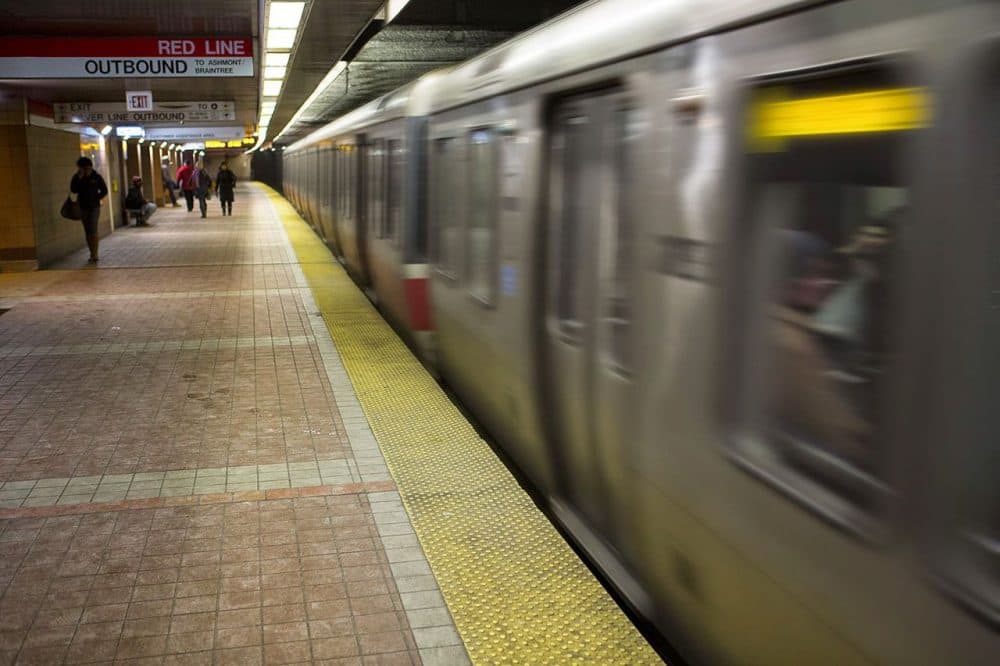Advertisement
MBTA Board Votes To End Late-Night Weekend Service By March 18

Late-night MBTA service is about to be gone — again.
The T's control board voted on Monday to end the late-night weekend service it offers on select transit lines by March 18, less than two years after it was launched.
In a presentation before the vote, MBTA assistant general manager Charles Planck told the board that late-night service limited access for overnight maintenance work and was not cost effective.
The T is typically required to conduct an equity analysis of any service that might be cut. Planck told the board on Monday that the agency didn't believe such an analysis was needed here because cutting late-night service didn't constitute a "major service change."
However, Planck said during a public meeting on the topic in January that the analysis was in progress and that initial findings showed that cutting the service would disproportionately affect minority and low-income riders.
Marc Ebuña, with the advocacy group Transit Matters, said after Monday's meeting that advocates would push to get the analysis released "because clearly there's an impact."
The MBTA held three public meetings to collect input about cutting the service. The T says 80 people attended those three meetings, and 272 comments were also received by phone, email and via social media — most in favor of keeping the service.
Cambridge resident Susan Ringler attended Monday's board meeting to advocate for keeping late-night service in place. She started a Change.org petition after attending one of the earlier public meetings on the topic and seeing that it was poorly attended.
Advertisement
Ringler said the service should be kept in place because it serves several different populations.
"It really is the kind of thing that knits together young people and restaurant workers and people who work odd jobs that have strange hours," Ringler said. "It really is the kind of thing that is so important for an urban center that is trying to grow and be dynamic and be a part of the future."
Malden resident David Senatillaka also spoke during Monday's meeting in support of keeping late-night service in place. He said the T did a poor job of advertising the service, resulting in low ridership.
"To truly be a world class city we need world class transit service," he said. "I think that late night service is a public good, a public service and you can’t always measure it by profitability."
Charlie Ticotsky, the policy director at Transportation for Massachusetts, echoed that sentiment.
"It is a comparatively expensive mode per ride, but public transit is a public good and we shouldn’t only look at these things in a dollars and cents way," Ticotsky said after the meeting. "There’s other benefits to society that you get from increased transit service, like fewer people driving drunk, it benefits the economy, it benefits the environment."
The board voted 4-0 to end the service without discussion Monday. (One board member, Brian Lang, wasn't in attendance.) But during a meeting in November, several board members expressed displeasure with how the service was performing.
“It’s incredibly expensive and not that many people are utilizing it,” board member Monica Tibbits-Nutt said then.
Late-night service was piloted to much fanfare in 2014 and continued in 2015 but with scaled-back hours and fewer bus lines. The T says the service cost $14.4 million to operate last fiscal year, and provided 1.4 million trips — about 0.4 percent of all bus and subway trips.
"I think what’s clear is that late-night service as it's been provided, the ridership just did not justify the investment that was being made," Transportation Secretary Stephanie Pollack told reporters after Monday's meeting.
The T's control board has been looking for ways to cut a deficit for next fiscal year that was initially estimated at $242 million. However, the T announced on Monday that projected deficit was now down to $138 million. The agency said that reduction was due in part to lowered expenses and improved revenues.
This isn't the first time the T has axed late-night service. The T's Night Owl program, which launched in 2001 and ran buses along train routes until 2:30 a.m. on weekend nights, was abandoned in 2005 due to low ridership and budget issues.
This article was originally published on February 29, 2016.

